|
|
OK, OK, I’ve really been remiss in blogging ‘the propagation of rare trees’ part of my masthead. I am particularly interested in growing some of the more unusual Asian species that seem hardy here on the West Coast of Canada. One of my favorites is Idesia polycarpa or ‘Wonder tree. They’ve got beautiful large leaves with a kind of red veining. I’ve got four of them which I grew from seed I collected at the Brooklyn Botanical Gardens. Another magnificent species is Paulownia tomentosa, which has beautiful blue foxglove-shaped flowers and massive spade-like leaves, (when young). The oldest one I grew from seed is growing at Cottonwood gardens in Vancouver (about 6 metres tall ) and is already flowering. I collected the seed from a beautiful old specimen growing in front of the VIA station in Thornton Park, Vancouver.
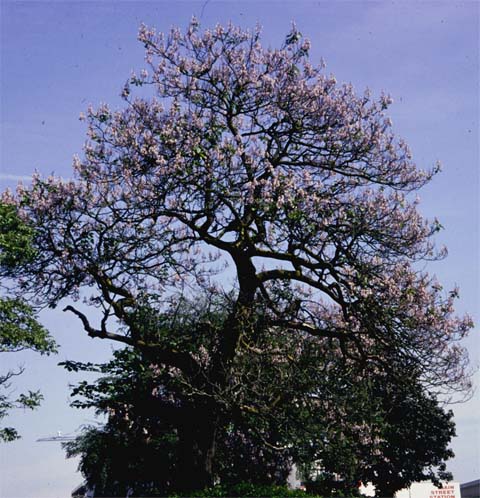
Paulownia in Thornton Park, Vancouver, British Columbia
A Belgian lawyer actually has gotten it together to initiate a legal case against American general Tommy Franks for war crimes committed during the invasion of Iraq, pointing out that Franks did nothing to stop the looting of the hospitals in Baghdad. The US is already threatening “diplomatic consequences.” The alleged “weapons of mass destruction” that were the reason for invading Iraq in the first place have not been found, 5 weeks into the US invasion, and likely won’t be. The Christian Science Monitor published a useful inventory of America’s fraudulent pretexts for invasions and covert operations over the past few decades, including the nonexistent MIG fighters that Reagan used as the basis for funding the covert war against Nicaragua’s Sandanista government and the constructed fiction of Iraqi soldiers snatching babies from Kuwaiti incubators. The big lie continues apace. I am seeing chilling parallels between the Bush administration’s manufacturing of consent on the Iraq invasion, and the stories that my parents (who grew up in Nazi Germany) have told me about how the Nazis maintained their regime’s grip on the hearts and minds of the German people while invading Poland and perpetrating the holocaust. A pliable, frightened population that is xenophobic and feeling economically vulnerable is a prerequisite for the successful demagogue.
There been concern in many quarters that nanotech organisms will soon eat the planet. Wordspy lists a new word for this – ‘global ecophagy.’ Perhaps these nanotech organisms have infected the brains of the Republican right.
Conversation with an ancient turtle:
 . .
Once again Al jazeera has nailed it. While the Museum of Antiquities (containing the first examples of human writing) was looted into oblivion (because the American occupation forces couldn’t spare a few soldiers to protect it), the Iraqi Ministry of Oil escaped the bombing and looting, unscathed. It had been heavily guarded by American troops since the invasion forces entered the capital. Sometimes the obvious is just obvious.
It’s come to light that some of the ‘enemy combatants’ imprisoned at camp X-ray in Guantanamo Bay Cuba are children under 16 years of age. They are detained without charges and have no access to lawyers or their families. What is this ‘freedom’ thing that America is fighting for anyway?
I nearly fell out of my chair in disbelief watching Barry Diller, (the CEO and chairman of USA Interactive, and founder of FOX Broadcasting) call for more media diversification and to keep some vestige of regulation on the concentration of media ownership in the United States. Maybe having only 5 companies controlling all broadcasting has become just too boring for even the oligopolists? He did say that ‘young’ people are turning to the Internet in droves. So what else is new? Still it was worth hearing one of the titans of the World Information Order use the word ‘oligopoly.’
Turtles are near and dear to my heart. Many are threatened with extinction. As I type this, my companion box turtle is glaring up at me balefully from my office floor. I have had him since 1967, since I was a young boy. This little refugee from the Triassic has lived through the Vietnam era, my adolescence, the invention of the personal computer, the Gulf Wars, and HIV. He is still basically interested in the same things he always was: food and chasing (the even older) female turtle around in a kind of elephantine march around my office. Looking at turtles often makes me weep. They are everything that we precocious, quick breeding, tool using, naked apes are not. They are conservative, slow growing and long lived. They are vulnerable in the extreme because they think that they are safe when they withdraw into their bony shells. Everything eats their eggs, they get caught in shrimp nets, crushed when they crawl across freeways and cooked into allegedly medicinal soups. I have seen their sad, confused faces gazing from fish crates on the Bowery, crowded into rank aquariums in low-end pet stores and tormented in buckets by cruel, pre-adolescent boys. I have a visceral memory of an enormous snapping turtle, covered in mud and moss laying perfectly spherical, glistening white eggs into the gravel beside a busy highway in a bleak Toronto suburb. The turtle was weeping with its exertion, or perhaps from the futility it perceived of its attempt at reproduction. The swamp it had always lived in had become a vestigial pot hole, filled with abandoned shopping carts. The sandbank that had sheltered generations of its young was now covered in pavement. Yet the ancient turtle carried on — I would like to say ‘oblivously,’ but I think not. Somehow it must have known what was happening to it. A world inhospitable to turtles would be a severely diminished place. We should all try to make their acquaintance before it is too late.
My friend Laura was riffing about stumbling on a show about the wildlife of Israel, while channel surfing for news on the Iraq war. These shows always seem to frame what appears to be pristine nature, without showing the post-industrial context. I am reminded of this whenever I drive down to the Comox Valley (Vancouver Island British Columbia), in the winter. Right next to the big box stores and the light industrial parks of the’ Edge City sprawl, lie a few lush fields which constitute the main wintering ground of the endangered trumpeter swan, the largest waterfowl on earth. There’s something deeply sad about seeing the trumpeters graze away against a backdrop of mini-malls and ‘U-store it’ units. One could easily film them without this context, but it would be a lie. It’s important to cop to understanding that a large proportion of the winter habitat of one of the most threatened and beautiful water birds on the planet is basically a part of Late Capitalist suburbia. Here is a somewhat grainy pic of a group of trumpeter swans from out the car window:
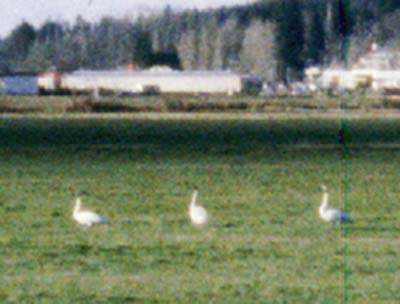 . .
Nature shows such as “Mutual of Omaha’s” Wild Kingdom where a staple of my childhood television experience. Unfortunately many of the shots in such shows were ‘set up’, inflicting considerable cruelty and suffering on the animals being filmed. The quintessential example of this is the 1958 film, ‘White Wilderness,’ in which lemmings were basically shovelled off of a precipice to reinforce the (erroneous) idea that they habitually commit suicide. The Nature magazine website debunks this myth and provides valuable insights into lemming behaviour. It turns out that we humans have a lot in common with them, especially around election time.
The most egregious ‘mockumentary’ filmmaking was of course perpetrated by Disney. There is a great article in Earth Island Journal by Chris Clarke, describing how Disney has misinformed generations of North American children on how animals actually interact with each other and with their environment.
While this fiction is understandable in its cartoons, Disney’s use of authentic seeming wildlife documentaries to reinforce the cornerstones of capitalist myth such as social Darwinism and erroneous notions of ecology as personality cult, continues to be pervasive.
Cougars or mountain lions frequent the island on which I live. Vancouver Island is one of the world centres for cougar population, but you rarely see them. One is lucky to catch a few glimpses in an average lifetime. My glimpse was out of my truck window around 8 o’clock at night on a rainy, winding road. The enormous cat jumped out of the darkness with all of the ease of a kitten jumping off of an armchair and into the pool of my headlights. Within an instant, it was gone. This fleeting, yet authentic experience gave me far more of a ‘frisson’ than any wildlife documentary ever could, despite and in fact, because of its evanescence. Through its overexposure in the Disnified world of ‘Animal Planet’ style documentaries, nature is suffering a crisis of the real. We have never been more distant from the cougar even though we may think that we are familiar with every hair follicle on its mediated face.
It’s become clear that the US has been using cluster bombs in its attack on the populated areas of Iraq. BBC world this evening broadcast images of limbless children who had been on the receiving end of these technological atrocities.
Kurt Vonnegut turned 80 this year and remains one of America’s most prescient authors.
Ruth sent me this link to a recent interview with him on ‘psychopathic personalities’ the war in Iraq.
Vonnegut when asked: “. . . do you have any ideas for a really scary reality TV show? ” answered:
I’ve been interested in tracking the US Psy Ops during the invasion of Iraq. Apparently entire planes are kitted out with equipment to intercept cell phone communications and to override local radio broadcasts with pro-US propaganda. The BBC World series ‘Click on Line’ always has an interesting analysis of cyberculture and in addition to the above topics also covered GPS ‘jamming’ equipment and the techno-glitches that lead to ‘friendly fire’ incidents.
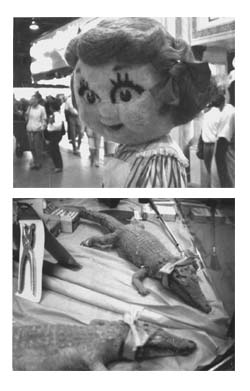
My mother surprised me today. She has been trolling the internet and snagged an interesting link to an article by John Pilger in Z Magazine entitled ‘We See Too Much, We Know Too Much. That’s Our Best Defense’ in which he basically asserts that our broad access to information has fundamentally changed the power dynamic, creating a problem for the hegemony in promoting propaganda. I hope he’s right. Anecdotally it seems to ring true but the consensus building mechanisms of polling and compliant mass media are extremely powerful within the US. How much ‘alternative’ information about Iraq is filtering down to the bulk of the population? Only time will tell.
I spent the day wandering around in a rainforest which is slated to be sold, probably to loggers. Freedom means being able to cut down a 300 year old western red cedar tree and make it into lumber for a deck.
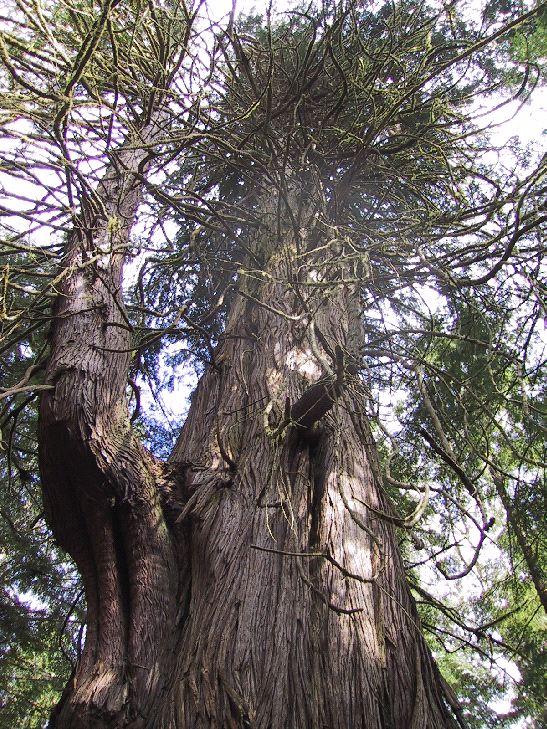
I am seeking solace in observing ruderal ecologies. I took my class to the local garbage dump today, where we saw broad and lanceolate leaved plantains (plantago), dock (rumex), bitter cress, crysanthemum leucanthemum and buttercup growing (and in fact thriving) in gravel soaked with toxic waste. Oddly, some of these are the very plants that are useful in cleaning toxins out of the human body, especially plantago and dock.
I remember (twenty years ago) standing by the Berlin Wall, looking out over the green expanse of a mine field between the West and the (then) Warsaw pact. European hares gamboled around lush tussocks,too light to trigger the lethal mines (or maybe they just knew where they all were.) The hares were being pursued by flocks of European buzzards and other raptors that had all but vanished from the surrounding cityscape. Wildflowers that had become extinct in the rest of Germany flourished in this ‘no-man’s land.’ The whole thing seemed like some kind of demented post-modern Serengeti, a ribbon of verdant green snaking through a concrete wasteland.
The catastrophe that was Chernobyl proved to be a boon for wildlife which could complete its life cycle before succumbing to the cancer that would kill creatures like us that have longer life spans. Our violence has created a paradise which is poison to us. Deer and birds teem in this death zone because we are not there.
Here are some Super 8 mm stills of the ruderal systems that existed between East and West Berlin, before the so-called ‘fall of communism.’ The images which I filmed in 1983, clearly show the European buzzards, hunting the hares on the green grass of the mine field.
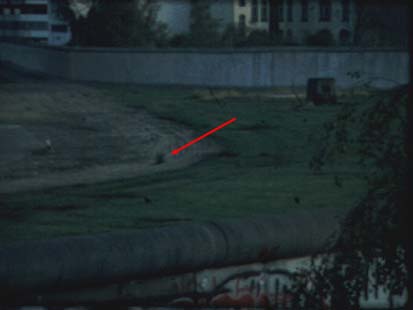
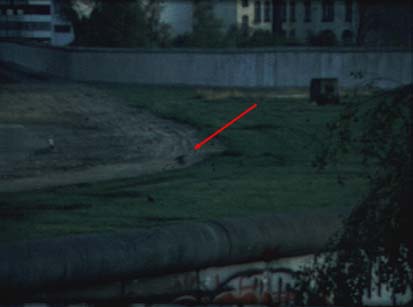
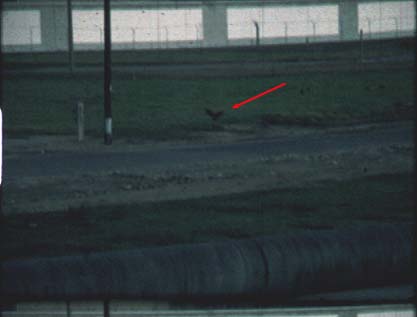
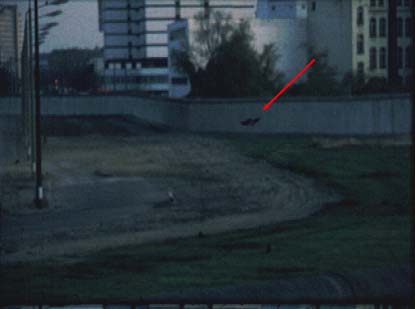
This is the sort of thing that keeps me up at night: American Marines interviewed in the ruins of one of Saddam’s opulent palaces (on tonights BBC World TV News) say they are awe struck by the contrast between the wealth of Saddam and the rest of the Iraqi people. They should feel very much at home in Iraq because America has one of the greatest income inequities in the industrialized world. Could it be that the American military is starting to promote class struggle?
I too have been tracking the ransacking of the Museum of Antiquities. This falls into the category of ‘meta-atrocity’ because it obliterates an irreplacable part of our collective human history. Orwell said it all.
Winston: “But it did exist! It does exist! It exists in memory. I remember it! You remember it!
“I do not remember it,” said O’Brian
-George Orwell 1984
|
|

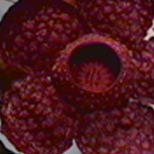


 .
. .
.





